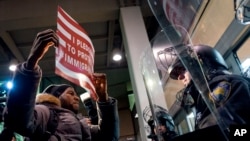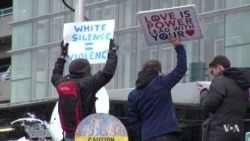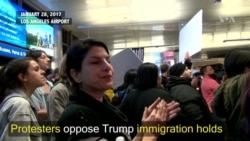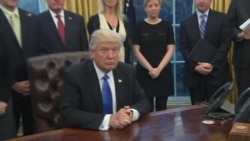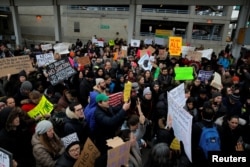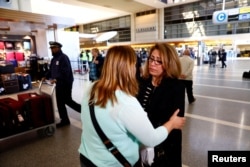A federal court has intervened after U.S. President Donald Trump’s executive order limiting immigration to the U.S. from seven Muslim-majority countries led to widespread confusion as refugees, green-card holders, students and workers were detained at American airports or barred from boarding international flights to the U.S.
Late Saturday, U.S. District Judge Ann Donnelly in New York had issued an emergency order that temporarily barred the deportation of people who had been detained after landing at U.S. airports with valid visas. The order also barred the detention of anyone with an approved refugee application.
Donnelly said in her order “There is imminent danger that, absent the stay of removal, there will be substantial and irreparable injury to refugees, visa-holders, and other individuals from nations” who are subject to the president’s order.
Similar court actions have followed in other jurisdictions, including Virginia, Massachusetts and Washington State.
A Homeland Security statement issued early Sunday said it will “comply with judicial orders,” but went on to say it will also “implement the president’s Executive Order to ensure that those entering the United Stated do not pose a threat to our country or the American people.”
Reports from federal authorities indicated at least 170 people had been detained since Trump signed his order at the White House on Friday.
Trump responds
Trump brushed off comments that his order could be seen as an anti-Muslim measure, and said the “very strict” crackdown he had ordered was working out “very, very nicely.” The new immigration rules target people from seven nations — all where a large majority of the population is Muslim — judged as possible threats to the United States.
WATCH: Protesters gather at New York's JFK airport
At airports in New York, Washington, San Francisco and other cities, however, large crowds of protesters were gathering. Lawyers, many of them from the American Civil Liberties Union, also came to airports to offer counsel to airport detainees or any other U.S.-bound travelers stranded abroad.
WATCH: Protests at Los Angeles Airport
Fearful family members of those unable to enter the country were thrown into confusion by the new rules and what they said was a lack of information about how they were being enforced. Thousands of people at the New York airport chanted their support for refugees, and for “love, not hate,” and held signs condemning the president’s policy.
Democrat Hillary Clinton, who lost to Trump in the November election and rarely commented since, tweeted “I stand with the people gathered across the country tonight defending our values and our Constitution. This is not who we are.”
As he signed his executive order Friday night, Trump said: “We’re going to have a very, very strict ban and we’re going to have extreme vetting [of would-be immigrants], which we should have had in this country for many years.”
By “extreme vetting,” Trump was referring to his plan to carefully and intensively investigate Muslims and other people deemed to be possible threats to the United States before they are allowed to enter the country.
WATCH: Trump: 'It's not a ban on Muslims'
“Slamming shut the doors to the United States of America, which has rigorously vetted refugees for years, is an attack on the basic accepted notion that people should be able to flee for their lives,” said Jason Cone, the executive director of the U.S. branch of Doctors Without Borders. “Refugees are mothers and fathers and children who want what we all want: a safe place to live their lives, free from war and persecution.”
Retno Marsudi, the foreign minister of Indonesia, which has the world’s largest Muslim population, but was not included in the nations whose citizens face restrictions for entering the U.S., told Reuters in a social media message that “We have deep regrets about the policy.”
.Lawmakers speak on both sides
U.S. lawmakers are speaking out both for and against the immigration restrictions.
House Speaker Paul Ryan, a Republican like Trump, defended the ban in a statement delivered by an aide Friday, even as his opponents circulated posts on social-media highlighting a strong statement Ryan made six months ago denouncing discrimination against Muslims.
“This is not a religious test, and it is not a ban on people of any religion,” Ryan’s spokeswoman AshLee Strong said.
Senator Ben Sasse, a Republican from Nebraska, said Trump was properly focused on protecting U.S. borders, but he added that the decree, as written, was “too broad.”
Republican Senator Jeff Flake of Arizona said Trump is right to be concerned about national security, “but it’s unacceptable when even legal permanent residents are being detained or turned away....”
Lena F. Masri, the national litigation director of the Council on American-Islamic Relations said of Trump’s order: “This is an order that is based on bigotry, not reality.”
John Cohen, a former Homeland Security official, said the president’s ban did not address the country’s “primary terrorism-related threat,” — people already in the U.S. who are inspired to radicalism by what they see on the internet.
House Homeland Security Committee Chairman Michael McCaul praised Trump’s order. McCaul said in a statement “with the stroke of a pen,” Trump had done “more to shut down terrorist pathways into this country than the last administration did in eight years.”
The Washington Post reported Saturday that calls and emails to more than a dozen other top Republican lawmakers, including Senate Majority Leader Mitch McConnell, went unanswered in the first day of the ban’s implementation. But some Republicans spoke out against the new policy.
Other lawmakers speak out
Congressman Charlie Dent, a Republican from Pennsylvania, counts a sizable Syrian population among his constituents in the metropolitan area of Allentown. He told The Washington Post of six people from the same family, owners of a home in Pennsylvania and all carrying valid visas, who were stopped at Philadelphia International Airport after arriving in the country on a Qatar Airways flight.
“This is ridiculous,” Dent said. “I guess I understand what his [Trump’s] intention is, but unfortunately the order appears to have been rushed through without full consideration.”
“This family was sent [back to the Middle East] despite having all their paperwork in order,” Dent added. “It’s unacceptable, and I urge the administration to halt enforcement of this order until a more thoughtful and deliberate policy can be reinstated.”
“Shame. Shame. Shame,” said Republican Senator Brian Schwartz of Hawaii in a tweet. “I feel sick.”
Senator Dianne Feinstein, a Democrat from California, told a reporter the ban is “an unbelievable action. It’s one thing to see that an individual is properly vetted. It’s an entirely different matter to say that because someone comes from a particular country or is a member of a particular faith that he or she has no access to this country.”
Other travelers have been thwarted in their attempts to enter the country as well, adding fuel to the protests at airports from coast to coast. The Los Angeles Times reported Saturday that most of the detainees there were from Iraq or Iran.
A 25-year-old medical student from Iraq studying in the U.S. told VOA’s Michael O’Sullivan at the Los Angeles airport she was joining the protest there because of the pain her “brothers and sisters” are feeling while “stuck at the gate at the airport.” She also said her plans to visit her family in Iraq now cannot happen, and they will not be allowed to visit her.
No access to those detained
Federal officials have not been allowing family members or lawyers any contact with detainees, so details are sketchy.
One immigration attorney, Jordan Cunnings, told the Los Angeles newspaper one of the detainees was a young Iranian mother who has held a U.S. green card, or legal work permit, for five years and is schedule to take her oath of citizenship in two weeks. Cunnings said the woman is traveling with her 11-month-old baby, who is an American citizen.
“People don’t have phone access or communication access to the people waiting for them, or their attorneys,” Cunnings said.
Cunnings also told the paper that without information, legal aid workers are scanning the crowds for people who might be looking for someone who has not shown up.
“We’re literally walking around asking people, ‘Are you waiting for someone who has been detained?’” he said.
Somali refugees
Somali refugees who have been waiting years for resettlement in the United States told VOA’s Somali service their flights to the United States were canceled by the order.
“We come from Dadaab [refugee camp] and have been in the U.N. complex in Nairobi [Kenya] for days, for the preparation of our flights to the U.S. on January 31,” Farah Mahad Bille told VOA Saturday. “We are told this morning that we are going back to Dadaab because of the U.S. president’s order. It’s an absolutely devastating loss of hope to us.”
Farhan Sulub, a Somali-American father who lived in the United States for 10 years, told VOA his wife was stopped at Dulles International Airport, outside the nation’s capital, although Sulub’s children were allowed to enter the country.
“The immigration officers in the airport called me as I was waiting for my wife and children,” he said. “They told me that my wife is not allowed to enter the U.S. because of her Somali nationality, but my children can go with me if I needed.”
UN urges US to reconsider
The United Nations refugee agency and the International Organization for Immigrants have joined the growing numbers of advocacy groups criticizing U.S. actions.
“The needs of refugees and migrants worldwide have never been greater, and the U.S. resettlement program is one of the most important in the world,” according to a joint statement by the two groups. Since the previous U.S. policy of welcoming refugees has enriched both the lives of the refugees and their new American societies, the two groups urged U.S. officials to reconsider the new policy.
“Resettlement places provided by every country are vital,” the international refugee-aid groups said, adding they are hopeful “that the U.S. will continue its strong leadership role and long tradition of protecting those who are fleeing conflict and persecution.”
VOA's Somalia Service contributed to this report.




